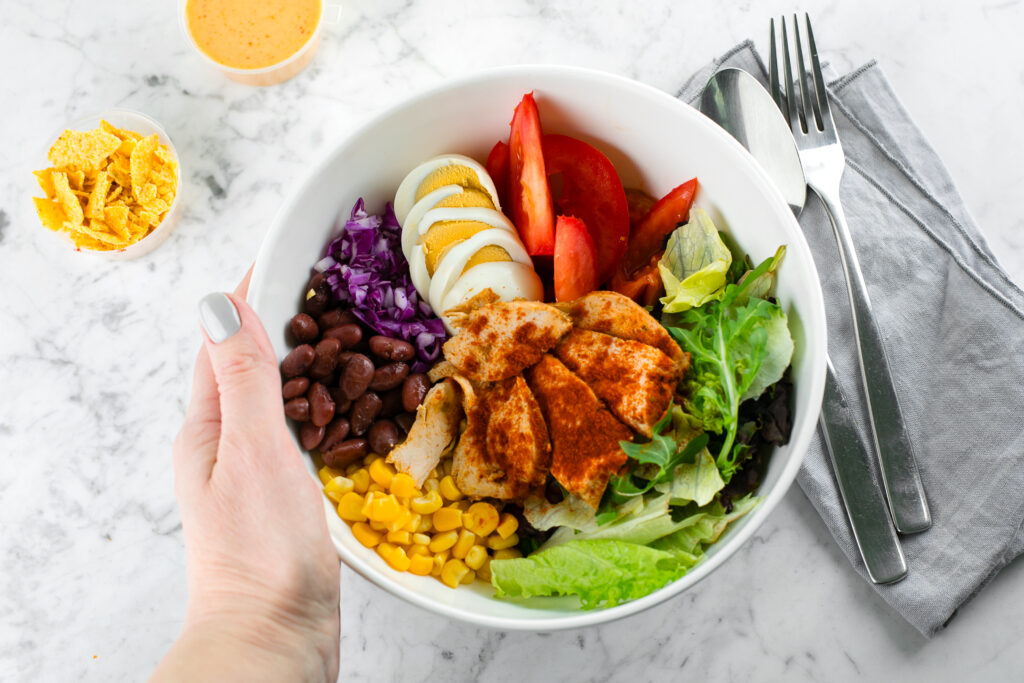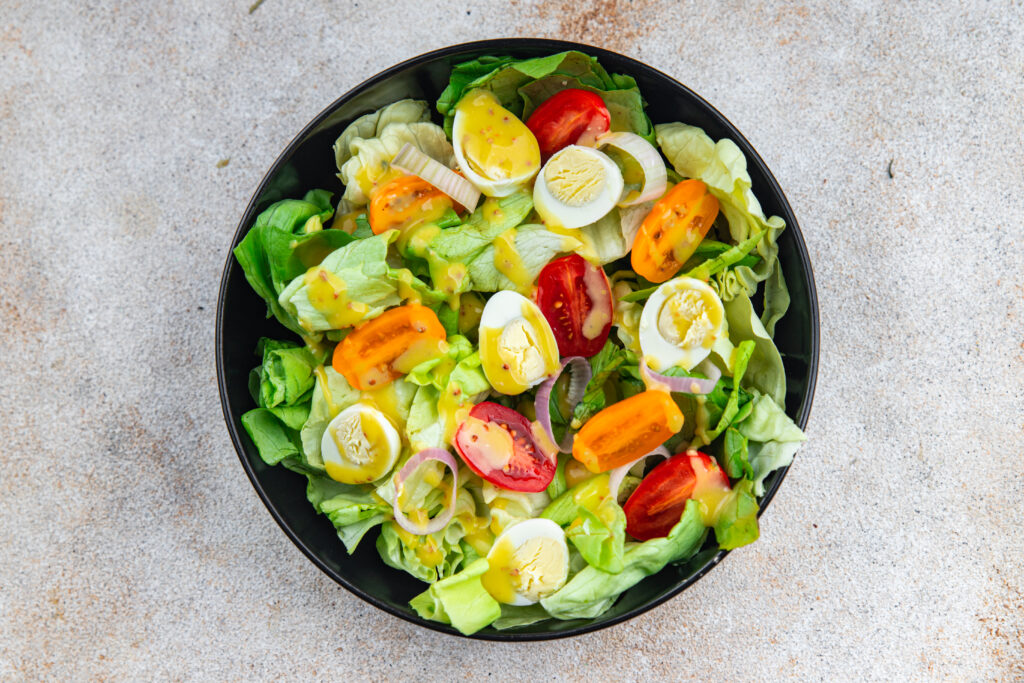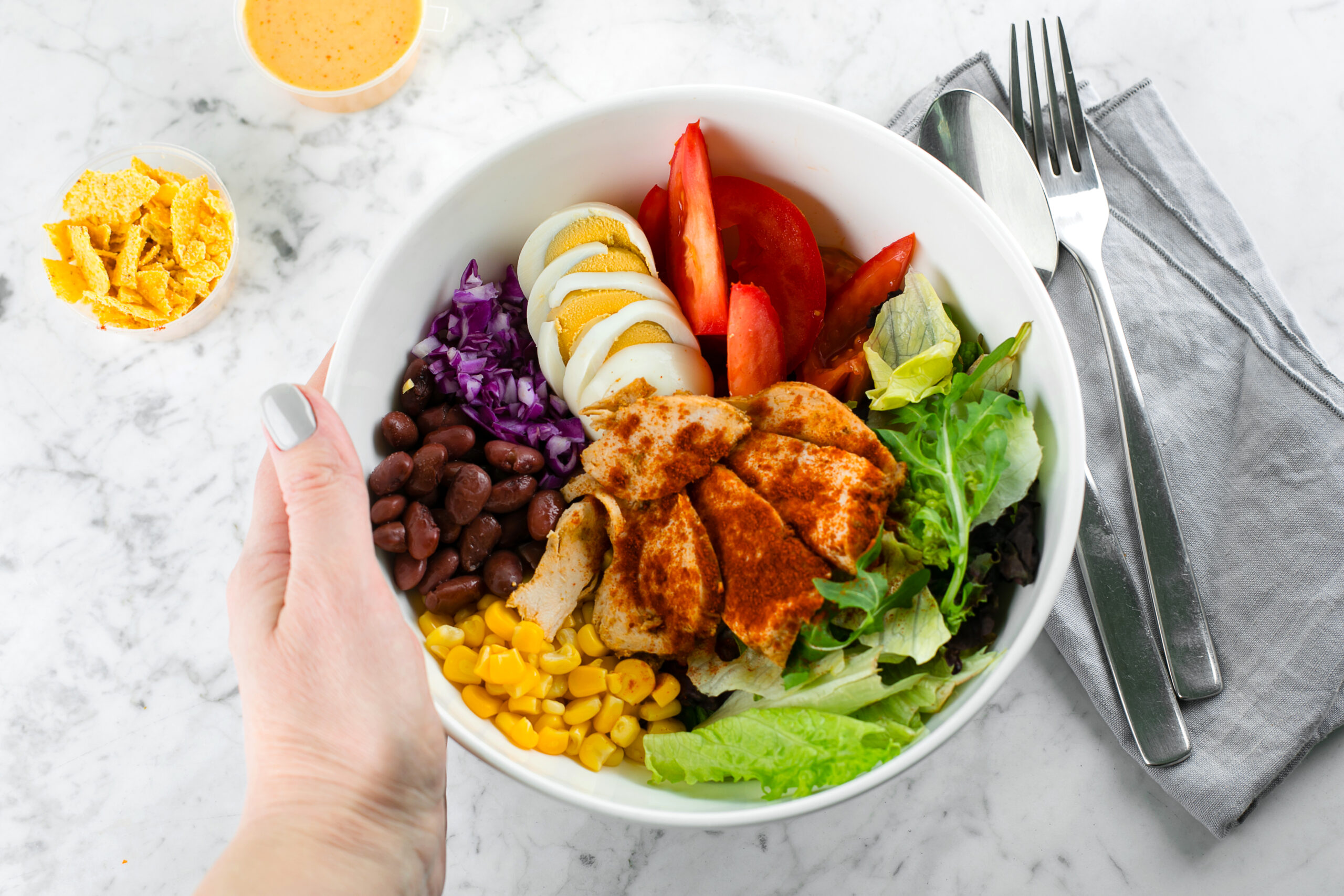Salads are often linked to healthy eating, but not all salads are ideal for weight loss. The Cobb salad is a hearty, protein-rich dish that includes healthy fats and a variety of nutrient-dense ingredients. While it provides essential nutrients, its calorie and fat content can make people question whether it supports weight management goals.
In this comprehensive guide, we’ll examine Is Cobb Salad Good for Weight Loss, break down its nutritional profile, discuss its health benefits and potential drawbacks, and share practical tips to make it a healthier choice for those looking to lose weight.

What Is a Cobb Salad?
Cobb salad originated in the 1930s at the Brown Derby restaurant in Hollywood. Its rich and hearty ingredients make it a favorite for many, whether served at restaurants or prepared at home. A typical Cobb salad includes:
- Chopped greens (like iceberg lettuce, romaine, or spinach)
- Grilled or roasted chicken
- Hard-boiled eggs
- Crispy bacon
- Avocado slices
- Crumbled cheese (blue cheese or feta)
- Creamy dressing (such as ranch or blue cheese)
This combination creates a flavorful and filling dish. However, the nutritional content can vary greatly depending on how it is prepared.
For example, a restaurant-style Cobb salad can have between 500 and 900 calories per serving, depending on portion size and added ingredients. For a detailed breakdown of its calorie content, see this nutritional analysis.
Nutritional Benefits of Cobb Salad
Cobb salad contains several ingredients that make it a nutrient-dense meal option. Let’s look at some of its benefits:
1. High Protein Content
The combination of chicken, eggs, and sometimes bacon provides a significant amount of protein. Protein is essential for:
- Building and maintaining muscle
- Keeping you full for longer periods
- Supporting overall body functions
2. Healthy Fats
Avocado adds monounsaturated fats, which are known for:
- Reducing bad cholesterol levels
- Supporting heart health
- Enhancing satiety, helping you feel full
3. Rich in Fiber
The greens and vegetables in a Cobb salad are excellent sources of dietary fiber. Fiber aids digestion, helps regulate blood sugar levels, and promotes a feeling of fullness.
4. Balanced Macronutrients
Cobb salad offers a balance of protein, fats, and carbohydrates, making it a well-rounded meal for those following a weight-loss plan.
For tips on maximizing these benefits, check out this guide on healthier Cobb salad choices.
Drawbacks of Cobb Salad for Weight Loss
Despite its nutritional value, Cobb salad may not always align with your weight-loss goals. Here’s why:
1. High-Calorie Ingredients
Certain components, such as cheese, bacon, and creamy dressings, are calorie-dense. For instance:
- One slice of bacon contains about 42 calories and 3 grams of fat.
- A tablespoon of blue cheese dressing adds 100 calories, mostly from fat.
2. Hidden Sugars
Many store-bought dressings contain added sugars, which can sabotage your weight-loss efforts. Always check labels for sugar content.
3. Portion Size Issues
A typical restaurant serving may be oversized, leading to calorie overconsumption. At home, using a smaller plate or bowl can help control portions.
Learn more about how specific ingredients can affect the calorie count in Cobb salad by visiting this article on sugar content in Cobb salad.

How to Make Cobb Salad Weight-Loss Friendly
The key to enjoying Cobb salad while staying on track with weight loss is making smart ingredient swaps. Here are some actionable tips:
1. Choose Lean Proteins
- Replace fried chicken with grilled or roasted chicken breast.
- Substitute turkey bacon for pork bacon, which contains fewer calories and less fat.
2. Opt for Healthier Dressings
- Use vinaigrettes made from olive oil and lemon juice instead of creamy dressings.
- Make homemade dressings to control sugar and fat content.
3. Add More Vegetables
- Increase the volume of low-calorie vegetables like cucumbers, tomatoes, carrots, and bell peppers.
- Greens like kale or spinach add extra nutrients without many calories.
4. Limit High-Calorie Ingredients
- Reduce the amount of cheese or choose a lower-fat option.
- Use a quarter of an avocado instead of a whole one to cut back on calories.
5. Portion Control
Prepare individual servings to avoid overeating. Using a food scale to measure ingredients ensures you stay within your calorie target.
For a step-by-step guide to reducing calories in Cobb salad, visit this detailed resource.
Comparing Cobb Salad to Other Salads
How does Cobb salad compare to other popular salad options? Here’s a quick look:
- Caesar Salad: Often higher in calories due to croutons and creamy dressing. Cobb salad offers more protein and fiber.
- Greek Salad: Lower in calories and rich in fiber but lighter on protein.
- Spinach Salad: Packed with nutrients but may lack the protein content of a Cobb salad.
Cobb salad strikes a balance between taste and nutrition, making it a better choice when prepared thoughtfully.
FAQs About Cobb Salad and Weight Loss
1. Is Cobb Salad High in Calories?
Yes, traditional Cobb salad can be calorie-dense due to bacon, cheese, and creamy dressing. Adjustments can significantly reduce its calorie count.
2. What Dressing Is Best for Weight Loss?
Low-calorie options like balsamic vinaigrette or lemon juice work well. Avoid store-bought creamy dressings with added sugars.
3. Can I Eat Cobb Salad Every Day?
Yes, if you customize it to reduce calories and balance it with other nutrient-dense meals.
4. Is Cobb Salad from Restaurants Healthy?
Restaurant versions are often higher in calories. Learn more about dining out smartly with Cobb salad by exploring this analysis of restaurant options.
Tips for Making Cobb Salad Part of Your Diet
Incorporating Cobb salad into your diet can be simple with the right strategies:
- Meal Prep: Pre-portion your salads for the week to save time and control calories.
- Experiment with Ingredients: Swap traditional ingredients for seasonal produce or plant-based alternatives.
- Balance Your Meals: Pair Cobb salad with lighter meals or snacks to maintain a calorie deficit.
Conclusion
Cobb salad can be an excellent addition to a weight-loss plan when prepared with care. Its high protein and nutrient content make it a satisfying meal, but calorie-dense ingredients require moderation. By customizing recipes and focusing on portion control, you can enjoy this classic dish while staying on track with your health goals.
For more ideas and tips, explore the internal links throughout this article to help you make the best choices for your diet. Remember, the key to success is balance, variety, and mindful eating.

